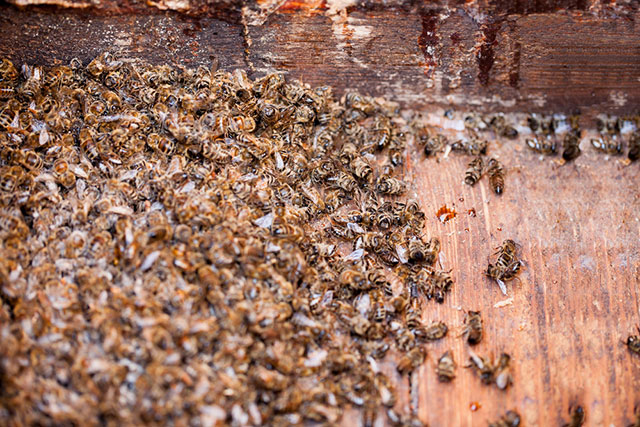
Part of the Series
Planet or Profit
The Environmental Protection Agency (EPA) announced on Wednesday that a preliminary risk assessment of the pesticide imidacloprid shows that the chemical poses a threat to some pollinators, specifically honeybees.
Imidacloprid is one of four neonicotinoid pesticides that honey producers and environmentalists have long suspected to be linked to rapidly declining bee populations in North America and beyond, a phenomenon widely known as colony collapse disorder. The EPA is in the process of reviewing the class of chemicals to determine whether they pose an ecological threat to pollinators, starting with imidacloprid.
Neonictonoids are nicotine-like pesticides that attack the central nervous system of insects and are commonly used to protect seed stocks and kill unwanted foliage-eating bugs like aphids and beetles.
The EPA’s preliminary risk assessment of imidacloprid found that the pesticide “potentially poses risk to hives when the pesticide comes in contact with certain crops that attract pollinators,” according to a press statement. The agency found that residues of imidacloprid with a concentration of 25 parts per billion or higher on flowering plants and their nectar are likely to have a negative effect on beehive populations.
Data shows that flowering crops such as cotton and citrus are likely to have concentrations of the pesticide above the 25 parts per billion threshold, while other crops, such as corn and leafy vegetables, either do not produce nectar that attracts bees or typically have residue levels below the threshold.
The European Union banned the use of neonicotinoids in 2013 despite considerable pushback from pesticide manufacturers, and environmentalists have urged the EPA to take action to limit use of the chemicals for years.
In 2015, the EPA temporarily halted the approval of new outdoor uses of neonicotinoid pesticides until the risk assessments are complete. The agency also proposed a ban on the use of pesticides that are toxic to bees, including neonicotinoids, when crops are in bloom and bees are being used to pollinate them.
“Delivering on the president’s National Pollinator Strategy means EPA is committed not only to protecting bees and reversing bee loss, but for the first time assessing the health of the colony for the neonicotinoid pesticides,” said Jim Jones, assistant administrator of the EPA’s Office of Chemical Safety and Pollution Prevention.
Bayer CropScience, the company that first introduced imidacloprid to the agricultural market in the mid-1990s, said in a statement released Wednesday that it is reviewing the EPA’s assessment, but “at first glance it appears to overestimate the potential for harmful exposures in certain crops, such as citrus and cotton, while ignoring the important benefits these products provide and management practices to protect bees.”
Pesticide manufacturers have furiously defended neonicotinoid pesticides in the face of widespread criticism, and environmentalists have accused the industry of ripping pages from Big Tobacco’s PR playbook in the past.
After a 60-day public comment period, the EPA will finalize its risk assessment for imidacloprid and take regulatory action if necessary. The EPA’s pesticide division produced the assessment in collaboration with state regulators in California and its Canadian counterpart, which reached the same preliminary conclusion.
The EPA plans to release preliminary risk assessments of three other neonicotinoid pesticides – clothianidin, thiamethoxam and dinotefuran – in December 2016.
Join us in defending the truth before it’s too late
The future of independent journalism is uncertain, and the consequences of losing it are too grave to ignore. To ensure Truthout remains safe, strong, and free, we need to raise $31,000 in the next 48 hours. Every dollar raised goes directly toward the costs of producing news you can trust.
Please give what you can — because by supporting us with a tax-deductible donation, you’re not just preserving a source of news, you’re helping to safeguard what’s left of our democracy.